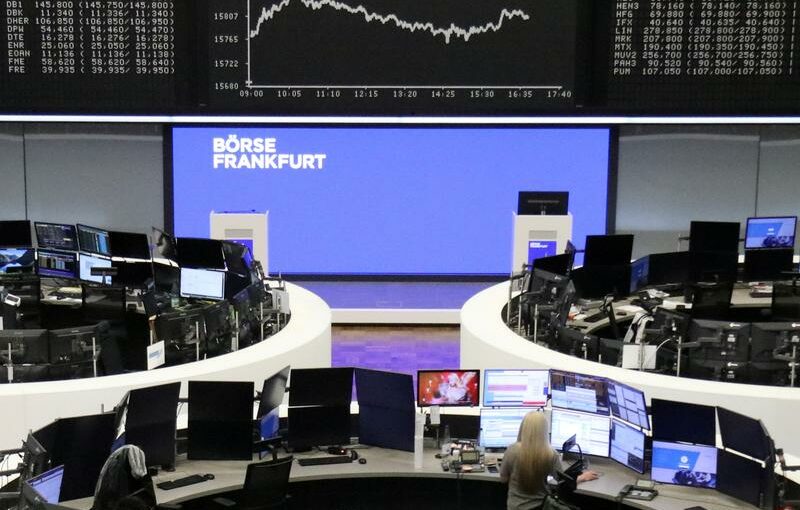WASHINGTON/LONDON (Reuters) -Stocks climbed globally to new records on Thursday after the U.S. Federal Reserve decision to start scaling back its bond-buying program this month and the Bank of England’s plan to keep interest rates on hold, dashing investors’ expectations for a hike.
European stocks held their own highs [.EU] while the pound tumbled nearly 1% after the hotly anticipated decision by the BoE, which would have been the first big central bank to hike since COVID-19 struck.
Britain’s bond markets also cheered the news as Wall Street traders prepared for more gains there after another dip in jobless claims figures. [.N]
“They (BoE policymakers) have a big communication challenge full stop,” said the head of Janus Henderson’s multi-asset team, Paul O’Connor.
“The question is why has the governor (Andrew Bailey) sounded so hawkish over the last couple of months … In speech after speech he has clearly nudged market expectations (for a rate hike) higher so they have a responsibility to articulate clearly how they prioritise the policy objectives.”
Oil prices turned negative on Thursday, reversing earlier gains in a volatile session after a report that Saudi Arabia’s oil output will soon surpass 10 million barrels per day for the first time since the onset of the coronavirus pandemic.
The report, from Saudi-owned Al Arabiya TV, came after the nation, along with other members of the Organization of the Petroleum Exporting Countries and its allies, agreed to stick to previously agreed production increases.
Brent crude fell 29 cents to $81.70 a barrel after earlier rising to $84.49 a barrel. U.S. West Texas Intermediate crude fell 77 cents to $80.09 a barrel. It earlier hit $83.42 per barrel.
“We are constructive in the short-term,” said SEB investment management’s global head of asset allocation, Hans Peterson, encouraged that neither the Fed nor the European Central Bank was racing to raise rates at the moment.
“We still think rates are so low that equities continue to have the upper hand”.
The BoE has been in a tricky position. It faces the challenge of rising inflation, which is set to more than double the bank’s 2% target this year. At the same time, household spending will be squeezed as the government scales back stimulus aid, including its job support scheme, and raises taxes, while Britain grapples with post-Brexit trade frictions and another wave of COVID-19 cases.
Only two of the BoE’s rate setters voted for an immediate 15 basis-point rate hike although it kept alive the prospect of one saying it would probably have to raise the bank rate from its all-time low of 0.1% “over coming months” if the economy performed as expected.
For now though, equity investors were just content that the major world money printers remain in no rush to remove the policy punch bowl.
The pan-European STOXX 600 index rose 0.38% and MSCI’s gauge of stocks across the globe gained 0.17%. The overall value of world stocks is now double what it was at the depths of the COVID-induced slump last year.
JUST THE JOB
For Wall Street watchers, a cheery third-quarter earnings season, coupled with an upbeat commentary about future growth from corporate America, has helped investors in U.S. equities as they largely dismiss concerns around rising prices, supply chain snags and a mixed macro-economic picture.[.N]
Even more, weekly jobless claims, which precede Friday’s big payrolls data, fell to a fresh 19-month low last week, suggesting the economy was regaining momentum again.
The S&P 500 gained 0.14% and the Nasdaq Composite added 0.41%. The Dow Jones Industrial Average fell 0.3%.
In Asia overnight, Japan’s Nikkei climbed 0.9% and touched its highest in a month, while MSCI’s broadest index of Asia-Pacific shares outside Japan crept up 0.4%.
The Asian index has been burdened by a spike in new coronavirus cases in China, which threatens to curb consumer spending in an already slowing economy also hampered by property market strains.
As expected, the Fed announced it would trim its bond buying by $15 billion a month from this month, while leaving open the option to quicken or slow the pace as needed.
Fed Chair Jerome Powell did sound slightly less sure inflationary forces would prove to be fleeting, enough to hit longer-term bonds and “bear steepen” the yield curve. [US/]
“Overall, we didn’t get anything that should imply higher market pricing of hikes than what we have now,” said Jan Nevruzi, an analyst at NatWest Markets.
Fed futures imply a first increase to 0.25% by June with another to 0.5% by the end of 2022..
“While not an ultra-dovish meeting, the result was still a far cry from some of the more stunning hawkish surprises seen recently from the likes of the Bank of Canada,” added Nevruzi.
The Canadian and Australian central banks have caused turmoil in their bond markets in the last couple of weeks by abruptly changing tack on policy.
Poland’s central bank surprised with an aggressive hike on Wednesday too and the Czech Republic on Thursday raised its main interest rate by 125 basis points, heightening a mass trend of rate rises in emerging markets already this year.
The BoE wrogfooting though had already shoved sterling down more than 1% to $1.3540, having been hovering around $1.3630 beforehand.
The dollar rebounded on Thursday from a dip a day prior as speculators consolidated long positions, following five months of steady gains.
The dollar index rose 0.644%, with the euro down 0.66% to $1.1533 after being hampered by expectations the European Central Bank will trail the Fed in tightening by some margin.
Long-dated euro zone bond yields had been nudging higher earlier but dipped with the BoE gyrations. British 10-year borrowing costs, which have doubled since mid-August, tumbled nine basis points, which left them just below 1% again.
In commodities, spot gold added 1.3% to $1,792.06 an ounce.
Bitcoin last fell 2.51% to $61,351.54.
Source: Read Full Article
